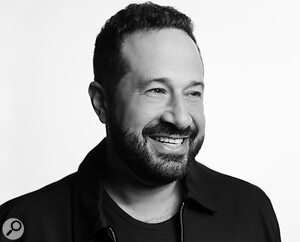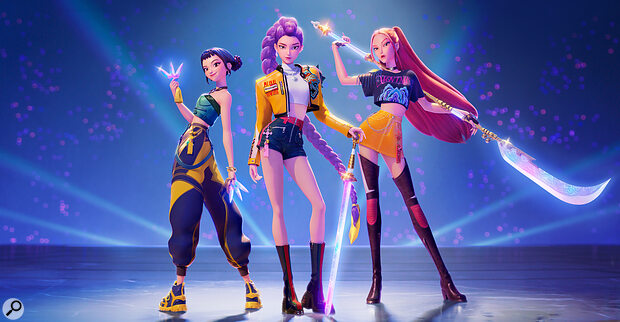Five years in the making, Netflix’s smash hit animated movie tested its music production team to the limit.
Released on 20th June this year [2025], KPop Demon Hunters has already become the second most‑watched movie on Netflix, with over 200 million views. Its soundtrack album has reached number one in more than a dozen countries, while the single ‘Golden’ has topped both the UK and US singles charts. At one point, seven of the soundtrack album’s songs could be found in the Billboard Top 100.
Ian Eisendrath was producer on all seven tracks, in addition to producing all of the vocals, jointly vocal arranging alongside EJAE, conducting the orchestral sessions, and supervising the music editing and mixing processes, which were handled by music mixer Curtis Douglas.
 Producer Ian Eisendrath coordinated the fantastically complex production process behind the music for KPop Demon Hunters.A graduate from the University of Michigan who has always been strongly interested in “music that drives story”, Eisendrath has worked as executive music producer and music director/supervisor on many Broadway productions, as well as several movies and TV productions. In 2022, he was hired by Spring Aspers, President of Music at Sony Pictures, to be at the heart of the music‑making for the KPop movie.
Producer Ian Eisendrath coordinated the fantastically complex production process behind the music for KPop Demon Hunters.A graduate from the University of Michigan who has always been strongly interested in “music that drives story”, Eisendrath has worked as executive music producer and music director/supervisor on many Broadway productions, as well as several movies and TV productions. In 2022, he was hired by Spring Aspers, President of Music at Sony Pictures, to be at the heart of the music‑making for the KPop movie.
“We had a really wonderful process where the directors, Maggie Kang and Chris Appelhans, Michelle Wong, and I, would spend many hours in meetings, delving into what each moment in the movie should sound like. What was the character arc? The tempo and tone of the music? What did the feeling need to be? How does the story progress from the first line of the lyric to the last? What are the references we want to share with the songwriters? Sometimes these references were the demos that EJAE and [Costa Rican composer] Daniel Rojas had made. More often, we worked with various groups that had stabs at creating these musical moments.”
Many different songs were written for each moment in the film, of which there often were dozens of different versions. Vocal sessions were extraordinary, with hundreds of backing vocals and over 1000 vocal takes for most songs. Eisendrath worked with recording engineer Derik Lee to carefully comp the vocals on each song, often “syllable by syllable”, and they handed up to 500 vocal tracks per song to mixer Curtis Douglas, who spent weeks working on them in similar levels of detail.
To The Max
EJAE started work on the project at the end of 2020, before the movie had been given the green light. Born Kim Eun‑jae in Seoul, EJAE is currently living in New York. A singer, songwriter and producer, she has written material for K‑pop acts like Aespa, Twice and others. She also ended up being the singer for the main character in the movie, Rumi.
 As well as co‑writing many of the songs, EJAE is also the singing voice of lead character Rumi.
As well as co‑writing many of the songs, EJAE is also the singing voice of lead character Rumi.
“I got onto the project via a friend, Daniel Rojas. In the beginning it was just the two of us creating demos for the directors to use in early screenings, there wasn’t a script yet. Our job was to try to figure out the sound of the girls in the movie, to develop a blueprint for the kind of K‑pop songs in it, and for the traditional Korean aspects. None of our early demos ended up in the movie, apart from some melodies of ‘How It’s Done’.
“With regards to K‑pop, it differs from American pop in that there are many more things going on. Whether it’s chord or melodic changes throughout the songs, or tons of stacked vocals, K‑pop is very maximalist. K‑pop is usually girl groups with multiple members, and each member has to shine. There may be a rapping section, or a high note section, where a vocalist shows off her vocal skills. Because it’s a group thing, there are many background vocals. Harmonies are huge in K‑pop.”
“EJAE and Danny wrote many, many songs,” recalls Ian Eisendrath. “When I joined the project, these demos allowed me to understand what kind of songs the film‑makers were thinking of in specific moments. Spring [Aspers] then handpicked and hired an unbelievable stable of writers who were all experienced K‑pop hit‑makers. They included The Black Label producers like 24, Ido, Teddy Parks and Kush, as well as Lindgren, Stephen Kirk and Jenna Andrews.
“Early in that process, we realised that bringing in EJAE as a collaborator for The Black Label instrumentals was a real win, because they have their distinctive sound, and EJAE has hers, and combining their forces worked really well. After things started to get going, a good friend of mine, Mark Sonnenblick, who I met while working in theatre and on other film projects, and who is great at writing lyrics for narrative songs, came in to collaborate with EJAE, as well as with Jenna and Stephen.
“The challenge for them was to write lyrics that work as a pop lyric, while also fitting the story and the character. These songs needed to have great hooks, and also allow the movie characters to reveal themselves and push the narrative forwards. You can have the most beautiful songs, but if nothing happens during them, except for someone sharing a feeling, the song will be cut down or cut entirely from the movie. You can have maybe one of those songs, because there are only 80 to 90 precious minutes to tell a story.
“My role was working closely with the directors, producer and songwriters to help craft the brief for each song, what they would do, what we needed from them dramaturgically. Spring and I worked closely together to decide what writers should be launched on each song. We ended up with five or six different songs for each moment, and every song had multiple versions, often dozens. It certainly wasn’t clear from day one what team would end up being the writers for the song for particular moments. It took a bit of time to find out which writers work best together, but it was a gift to realise that EJAE and Mark are this incredible super team that when they joined forces with The Black Label created something that I don’t think has ever been heard before in film and K‑pop.”
Story Time
The Black Label was founded in 2015 by YG producers Teddy Parks and Kush, in association with YG Entertainment, one of the ‘big four’ companies in K‑pop. “The directors, producer and I would meet remotely with The Black Label at least once every couple of weeks,” remembers Eisendrath. “We spent a lot of time working through the vibe and feel of the music. These tracks were sent to EJAE and Mark, and they would add their toplines and lyrics. Then we’d send them back to The Black Label, and discuss what adjustments they needed to make. Since we had so many writers in so many time zones, my role was to be the hub of the songwriting process, to make sure everyone’s connected, and to keep the songwriters up to speed with all of the story and picture development happening at Sony Pictures Animation in LA.”
“Ian worked with The Black Label and all these amazing producers to create beautiful tracks,” confirms EJAE. “Their awesome fire beats were sent to Mark and I, and to start with, I would lay down a bunch of melodies and some rough lyrics and concepts. Mark and I were given guidelines of what the song needs to say in the scene, and what the characters were trying to emote. Me being a K‑pop person and him being into theatre was a very interesting mix. Our aim was to make K‑pop bangers, but lyrically we kept coming back to the storyline. We wanted it to be authentic K‑pop, so bringing Korean lyrics into it also was really important to the film‑makers and I.
“I write in my small bedroom studio, where I have Ableton, a Universal Audio Apollo Twin, and I love my Neumann TLM 102. I’m also very proud of my vocal chain, which has a gate, a de‑esser, EQ, Waves CLA‑2A, Valhalla reverb and Waves H‑Delay. I know how to vocal produce and all that stuff. So I imported the track, and put down some ideas for the lead melody, and if I have ideas for the background harmonies already, which I usually do, I recorded them as well. I record every idea I have. Once I had a bunch of ideas, Mark and I would meet on Zoom and we dissected each melody, edited it, and he also would have his input. That was our writing process. Once we Frankensteined the melody to what we thought was great, we worked on the lyrics.”
Black Gold
‘Golden’, the biggest hit from the soundtrack and movie, also plays a central role in the film’s narrative. Eisendrath explains, “Before the song that you heard was written, there were five songs also using the word ‘gold’ or ‘golden’ in the hooks, written by three different teams. None of them quite worked for the film. The directors and myself spent a long time talking about this. This song was particularly hard. It is what’s called an ‘I want song’ in film and theatre. It articulates what the characters are going to run after for the whole film, what they want. And the audience has to get invested in that. In this song, it’s Huntr/x’s desire to dominate the world. It’s a first‑half‑of‑life goal, a very immature, binary, simplistic thing: ‘Kill the demons, become superstars. We’re good. That’s what we want.’
“At the same time, the audience doesn’t know the characters that well yet, so the song also has to provide some exposition. We had a breakthrough when we realised that this song is also our opportunity to show the audience a little bit about each of the girls, with them singing about their pasts, and feeling victorious about what’s going to happen. Of course, something is going to knock them over, so that what they want is thrown into disarray. Then it becomes one of those stories where, through facing trials and tribulations, they change. And the thing they want changes. It’s not what they thought they...
You are reading one of the locked Subscribers-only articles from our latest 5 issues.
You've read 30% of this article for FREE, so to continue reading...
- ✅ Log in - if you have a Digital Subscription you bought from SoundOnSound.com
- ⬇️ Buy & Download this Single Article in PDF format £0.83 GBP$1.49 USD
For less than the price of a coffee, buy now and immediately download to your computer, tablet or mobile. - ⬇️ ⬇️ ⬇️ Buy & Download the FULL ISSUE PDF
Our 'full SOS magazine' for smartphone/tablet/computer. More info... - 📲 Buy a DIGITAL subscription (or 📖 📲 Print + Digital sub)
Instantly unlock ALL Premium web articles! We often release online-only content.
Visit our ShopStore.

